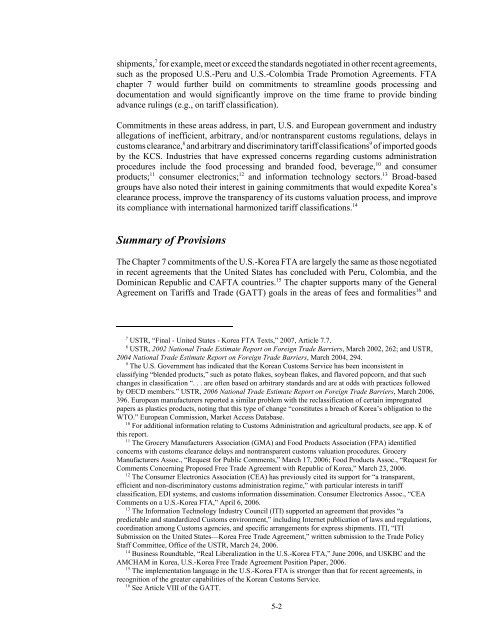U.S.-Korea Free Trade Agreement: Potential Economy-wide ... - USITC
U.S.-Korea Free Trade Agreement: Potential Economy-wide ... - USITC
U.S.-Korea Free Trade Agreement: Potential Economy-wide ... - USITC
You also want an ePaper? Increase the reach of your titles
YUMPU automatically turns print PDFs into web optimized ePapers that Google loves.
shipments, 7 for example, meet or exceed the standards negotiated in other recent agreements,<br />
such as the proposed U.S.-Peru and U.S.-Colombia <strong>Trade</strong> Promotion <strong>Agreement</strong>s. FTA<br />
chapter 7 would further build on commitments to streamline goods processing and<br />
documentation and would significantly improve on the time frame to provide binding<br />
advance rulings (e.g., on tariff classification).<br />
Commitments in these areas address, in part, U.S. and European government and industry<br />
allegations of inefficient, arbitrary, and/or nontransparent customs regulations, delays in<br />
customs clearance, 8 and arbitrary and discriminatory tariff classifications 9 of imported goods<br />
by the KCS. Industries that have expressed concerns regarding customs administration<br />
procedures include the food processing and branded food, beverage, 10 and consumer<br />
products; 11 consumer electronics; 12 and information technology sectors. 13 Broad-based<br />
groups have also noted their interest in gaining commitments that would expedite <strong>Korea</strong>’s<br />
clearance process, improve the transparency of its customs valuation process, and improve<br />
its compliance with international harmonized tariff classifications. 14<br />
Summary of Provisions<br />
The Chapter 7 commitments of the U.S.-<strong>Korea</strong> FTA are largely the same as those negotiated<br />
in recent agreements that the United States has concluded with Peru, Colombia, and the<br />
Dominican Republic and CAFTA countries. 15 The chapter supports many of the General<br />
<strong>Agreement</strong> on Tariffs and <strong>Trade</strong> (GATT) goals in the areas of fees and formalities 16 and<br />
7 USTR, “Final - United States - <strong>Korea</strong> FTA Texts,” 2007, Article 7.7.<br />
8 USTR, 2002 National <strong>Trade</strong> Estimate Report on Foreign <strong>Trade</strong> Barriers, March 2002, 262; and USTR,<br />
2004 National <strong>Trade</strong> Estimate Report on Foreign <strong>Trade</strong> Barriers, March 2004, 294.<br />
9 The U.S. Government has indicated that the <strong>Korea</strong>n Customs Service has been inconsistent in<br />
classifying “blended products,” such as potato flakes, soybean flakes, and flavored popcorn, and that such<br />
changes in classification “. . . are often based on arbitrary standards and are at odds with practices followed<br />
by OECD members.” USTR, 2006 National <strong>Trade</strong> Estimate Report on Foreign <strong>Trade</strong> Barriers, March 2006,<br />
396. European manufacturers reported a similar problem with the reclassification of certain impregnated<br />
papers as plastics products, noting that this type of change “constitutes a breach of <strong>Korea</strong>’s obligation to the<br />
WTO.” European Commission, Market Access Database.<br />
10 For additional information relating to Customs Administration and agricultural products, see app. K of<br />
this report.<br />
11 The Grocery Manufacturers Association (GMA) and Food Products Association (FPA) identified<br />
concerns with customs clearance delays and nontransparent customs valuation procedures. Grocery<br />
Manufacturers Assoc., “Request for Public Comments,” March 17, 2006; Food Products Assoc., “Request for<br />
Comments Concerning Proposed <strong>Free</strong> <strong>Trade</strong> <strong>Agreement</strong> with Republic of <strong>Korea</strong>,” March 23, 2006.<br />
12 The Consumer Electronics Association (CEA) has previously cited its support for “a transparent,<br />
efficient and non-discriminatory customs administration regime,” with particular interests in tariff<br />
classification, EDI systems, and customs information dissemination. Consumer Electronics Assoc., “CEA<br />
Comments on a U.S.-<strong>Korea</strong> FTA,” April 6, 2006.<br />
13 The Information Technology Industry Council (ITI) supported an agreement that provides “a<br />
predictable and standardized Customs environment,” including Internet publication of laws and regulations,<br />
coordination among Customs agencies, and specific arrangements for express shipments. ITI, “ITI<br />
Submission on the United States—<strong>Korea</strong> <strong>Free</strong> <strong>Trade</strong> <strong>Agreement</strong>,” written submission to the <strong>Trade</strong> Policy<br />
Staff Committee, Office of the USTR, March 24, 2006.<br />
14 Business Roundtable, “Real Liberalization in the U.S.-<strong>Korea</strong> FTA,” June 2006, and USKBC and the<br />
AMCHAM in <strong>Korea</strong>, U.S.-<strong>Korea</strong> <strong>Free</strong> <strong>Trade</strong> <strong>Agreement</strong> Position Paper, 2006.<br />
15 The implementation language in the U.S.-<strong>Korea</strong> FTA is stronger than that for recent agreements, in<br />
recognition of the greater capabilities of the <strong>Korea</strong>n Customs Service.<br />
16 See Article VIII of the GATT.<br />
5-2

















